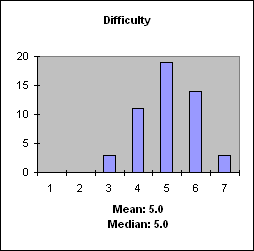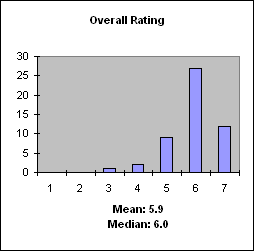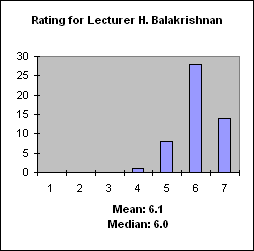6.829 Computer Networks
How The Internet Really Works
(3.2
1.7
6.4)
Lecturer: H. Balakrishnan
NeLxt Term: Not Offered.
Lecturer's Rating: H. Balakrishnan 6.1/7.0
Prerequisites: 6.033, programming skills, time
|
Response rate: 51 out of 93
Difficulty: 5.0/7.0
Overall Rating: 5.9/7.0
Term Evaluated: Fall 2001
|



Lecturer's Comments:
6.829 is a graduate-level class (H 3-0-9) whose goals are:
-
To understand the state-of-the-art in network protocols, architectures and applications.
-
To understand how networking research is done.
-
To investigate novel ideas in the area via semester-long research projects.
The past few years have seen a remarkable growth in the global network infrastructure. The Internet
has grown from a research curiosity to something we all take for granted, and is becoming as essential
as the ubiquitous telephone and utility networks. It has been able to withstand rapid growth fairly
well and its core protocols have been robust enough to accomodate applications that were unforeseen
by the original Internet designers, such as the World Wide Web.
How does this global network infrastructure work and what are the design principles on which it is based?
In what ways are these design principles compromised in practice?
How do we make it work better in today's world?
How do we ensure that it will work well in the future in the face of rapidly growing scale and heterogeneity?
And how should Internet applications be written, so they can obtain the best possible performance both for themselves and for others using the infrastructure?
These are some issues that we will grapple with in this course. The course will focus on the design,
implementation, analysis, and evaluation of large-scale networked systems.
Topics include internetworking philosophies, unicast and multicast routing, congestion control,
network quality of service, mobile networking, router architectures, network-aware applications,
content dissemination systems, network security, and performance issues. Material for the course will
be drawn from research papers, industry white papers, and Internet RFCs.
Students universally felt that the course taught them what they wanted to know
about computer networks. They commented that the class focused mostly on
applications
The majority of students in the class were MEng and Graduate students in
Course VI-2 and VI-3. Many
took the class to learn more about computer networks,
and also to help with their thesis research.
Lecturer H. Balakrishnan (6.1/7.0, 51 responses) received great reviews.
The students found him exciting and enthusiastic, but went a bit too fast
sometimes. On the whole, the lectures were very clear and concise.
As their primary responsibility was to grade assignments,
the TAs did not teach. Few students commented about the TAs.
TA X. Yang (no rating) received few comments.
TA D. Andersen (no rating) also received few comments
The problem sets were very long and difficult, but there were only 2 of them.
Many students remarked that they were often worded ambiguously.
Students credited the problem sets with helping them learn the material.
Some students collaborated on problem sets, and others did not.
No students used a bible.
Most students found the design project open-ended and very long. But many
commented that the design project was very similar to actual research in
networking, and was therefore a very valuable educational experience.
There is no textbook for 6.829, but there are a set of class notes.
Students found the class notes to be generally helpful, but some
lectures had no corresponding notes.
Many thought the quiz was difficult and that it took a lot of preparation to
score well. Others thought the quiz was only a
regurgitation of the readings.
Almost all of the students objected to the multiple choice sections.
Students recommend having experience reading scientific papers
and familiarity with the 6.829 simulator before taking the class.
In a way, the class was very much like doing thesis research in networking.
"Very good lecturer; He's like an encyclopedia"
"Take it if you're interested in everything you need to know about computer networks!"
Dated: January 13th, 2002
Eta Kappa Nu, MIT





